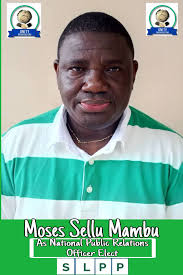By Hassan Osman Kargbo
The election of Moses Mambu as Publicity Secretary of the ruling Sierra Leone People’s Party (SLPP) during the recent National Delegate Conference at the Bintumani International Conference Centre has ignited a lively national debate over the perceived neutrality and independence of civil society actors.
Known for his long-standing voice as an outspoken civil society activist, Mambu’s transition to a high-ranking political role has raised critical questions about the continued credibility and influence of civil society organisations (CSOs) in Sierra Leone’s public discourse. Citizens and stakeholders alike are asking: Can civil society still maintain impartiality when one of its prominent figures now holds political.
In recent years, CSOs in Sierra Leone have emerged as powerful advocates for accountability, transparency, and citizen rights. Many Sierra Leoneans have come to rely on them for fearless critiques of governance, as well as mobilising action on issues like corruption, service delivery, and public welfare.
Some members of the public now feel betrayed by Mambu’s transition to politics. “He used to challenge the government and stand with us,” said one concerned observer. “Now he speaks for the party. How do we know who is representing the people?”
Similarly, others worry that his new role might cast doubt on the legitimacy of civil society platforms. “If Mambu, someone we saw as independent, chooses a political path, how can we trust others who critique the government?” asked a civic-minded youth in Freetown.
In addition, constitutionally, every Sierra Leonean has the right to align with any political party. Yet the real concern lies in the symbolic shift—a well-known CSO figure now fully aligned with the political system he once challenged. This shift could blur the lines that once defined civil society as a separate check and voice for citizens.
Legal expert and civil liberties advocate Barrister Muhammad Sannoh weighed in: “Membership in political parties is protected by law. However, people expect civil society activists to remain detached from direct partisan alignment so they can hold power
Moreover, Moses Mambu’s transition may also send a chilling signal to civil society actors across the country. Will other bold campaigners now hesitate to speak out for fear of being drawn into politics? Will donors, journalists, and citizens begin to question the neutrality of CSOs?
At a gathering of community development activists, concerns were raised about future credibility. One representative said, “If one of our most vocal leaders chooses political office, public trust in other independent voices may start to erode.”
Others countered that a healthy democracy allows for citizen participation in politics, and that Mambu’s decision was a personal choice consistent with democratic freedoms. “A democracy thrives when committed individuals—like Moses—take their experience from civil society and run for office,” said a longtime CSO coordinator.
For observers, the underlying question is how civil society can maintain its critical role when activists cross into politics. Many argue that careful boundaries and transparency are key. It becomes crucial that remaining CSOs declare their sources of funding, governance structure, and public positions clearly and consistently to reaffirm their independence.
Speaking from one national CSO network, a member said: “We must continue to speak truth to power, even if some of our former colleagues enter government. Our legitimacy comes from the people—we must never betray their trust.”
Moses Mambu’s election as SLPP Publicity Secretary undeniably positions him within the corridors of power he once critiqued. Whether his new role will enhance the party’s messaging or distance him from citizen concerns remains to be seen. But the larger consequence lies in public perceptions of civil society’s impartiality, effectiveness, and independence.
For civil society in Sierra Leone, this development is a turning point. It prompts reflection on identity, boundaries, and trust. As the public watches closely, CSO leaders may need to recommit to transparent governance, robust public engagement, and clear communication to maintain the faith placed in them.
Only time will tell whether civil society will emerge after this moment stronger or whether public confidence has been irreversibly shaken.










